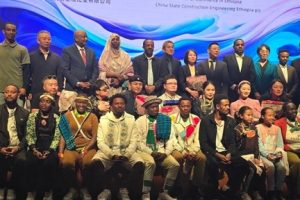
Reestablishing Ethio-Eritrea trade relation is under discussion and so scholars are forwarding various ideas on how to build solid and long lasting trade relationships between the two countries.
Recently Eritrea’s Presidential Advisor Yemane Gebreab told local media that after making peace, the diplomatic and people to people ties between Eritrea and Ethiopia have made great strides and efforts are also underway to consolidate relations in all aspects.
Having signed peace deal, both countries opened their border crossings to the public, but now the border is completely closed until comprehensive trade agreements are reached between Ethiopia and Eritrea.
According to AAU school of law Asst. Prof. Martha Belete, Trade relation between the two countries should base on set principles and it must be institutionalized.
The two countries have made public that series of discussions are going on to come up with a mutually beneficial trade deal. In regard to this, Martha advises both to include area coverage, value cap, type of product and number of travels under the category of governing cross border trade of the pact. “I believe the pact should have similarity to the agreements with Sudan and the other neighboring countries.”
Regarding to the form of agreement, she says it could range between bilateral preferential trade agreements or may opt for a kind of regional arrangement which will include other Horn countries like Djibouti, Sudan and so on.
Speaking of the benefits of establishing single post border trade, she says :“If we take the East African Community case (a five member states economic arrangement), the establishment of a single post border trade, as indicated in some reports, boosted trade facilitation across borders of the members by harmonizing border control regulations and procedures.” As a result she states, it enabled expeditious and more effective border control mechanism. It also limits/ avoids repetition of clearing procedures.”
She goes on saying that looking at this good experience, establishing the single post border trade between Ethiopia and Eritrea will benefit the countries at least in terms of trade facilitation. However, this again must be based on pre-determined rules or principles as agreed between the countries. “Specific matters as to the manner of redistribution of revenue collected at the border must be agreed upon beforehand”.
Mentioning the cases of Czech and Yugoslav she states that principles or rules based separation of countries could prevent bloodshed and helps in establishing a smooth future relation.
Therefore, Ethiopia and Eritrea can avert possibilities of conflict through legalizing their verbal agreements, as to Martha. “I believe it is possible for the two countries to establish a regional economic arrangement aimed at harmonizing their trade rules etc. Here also, the countries should provide specifics unless otherwise, just agreeing to form, for example, FTA without providing specifics will not bring meaningful fruit to their relation,” she underlines.
On the other hand, Ethiopia has signed and ratified the African Continental Free Trade Agreement (AfCFTA). The agreement intends to create the largest free trade area consisting of the 54 African countries to trade freely with each other.
Ethiopia, as a country ratifying the agreement, gets this benefit with the other African countries that have ratified the agreement. The same will be true for Eritrea when it ratifies the agreement, she notes.
Abebe Aynete, Peace and Security Senior Researcher and Research Director at the Ethiopian Foreign Relations Strategic Study Institute, recently told The Ethiopian Herald that following the rapprochement between Ethiopia and Eritrea the Horn countries are breathing peace which is a critical tool to improve economic and political integration to the region.
As the Horn countries are now enjoying peace and cooperation, CFTA will give an impetus to the economic integration in the region, he says. To ensure sustainable peace and cooperation, realizing the integration is a must, he therefore, notes that Ethiopia ought to have legal trade agreement with Eritrea sooner than later.
Of late , Ministry of Foreign Affairs Spokesperson Nebiat Getachew has told Xinhua that there is still work to be done to better structure the peace deal with Eritrea and efforts are being undertaken to this end.
“Activities are being undertaken to make the Ethio-Eritrea peace deal sustainable, structured and all-inclusive between the two countries,” he notes. However, he says the peace deal has already overcome the biggest obstacle standing between the two countries, that being getting rid of two decades of mutual hostility.
Buying into the spokesperson’s ideas, Yemane acknowledges the fruits of the rapprochement that allow the nationals of the two nations to see each other after 20 years, As to him, the countries would achieve more fruits in the spheres of diplomacy through legalizing their verbal agreements next budget year.
The Ethiopian Herald, July 2/2019
BY YOHANES JEMANEH





